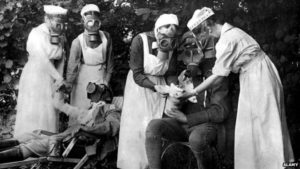Agriculturist and politician Gifford Pinchot, writing in 1917, noted that “the world will never be the same” after the destruction of lives and lands during the Great War (1914-1918). While separated by the Atlantic Ocean and determined to remain neutral, the United States also experienced change at the same time.
Some 25,000 American women who had spent more than four years serving the Allied cause, not only in France and Great Britain, but also in Serbia and Russia, accompanied returning U. S. soldiers in 1919. These women volunteered for duty in European hospitals and with refugees displaced by invasion. They worked on battlefields, in the trenches, in communication posts, and YMCA canteens.
The Red Cross provided medical and recreational services in World War I to military personnel and their families. More than 18,000 women volunteered as nurses and 4800 ambulance drivers were recruited for work in the war zones. Of those 296 nurses died and 127 drivers died.
In the United States, training camps were thrown up in areas with more desirable weather, i. e. the southern states. Yet these training camps were far from being resorts. They were located in less desirable places near railroad hubs. Immediately saloons and brothels sprang up within walking distance of the post front gate. Many of the young soldiers were gullible to the bright lights and seedy conditions there.
It wasn’t long before women’s groups demanded that red light districts be outlawed as well as saloons. Surprisingly, the federal government willingly worked with the women’s clubs to improve health standards, abolish saloons and houses of prostitution near military bases, and readiness to “Feed the Troops.” With the organizational skills developed through club work, women volunteered for such tasks as selling war bonds, providing wholesome recreation for soldiers, sailors, and airmen, and managing canteens.
Women, at that time, discovered a means to by-pass women’s suffrage issues. In the general election of 1918 mail-in ballots were not an option. Rather, wives of officers were allowed to vote for their husbands without his approval of her ballot. American women pounced on this opportunity to allow them to cast votes.
Two new amendments became much more acceptable after the war. Women had fought along side the military to outlaw the production, sale, and consumption of alcohol on military bases. By 1920 alcohol was abolished in the United States.
By exhibiting organization skills as well as selling bonds, providing recreation for soldiers, and managing canteens, the federal government realized women were competent to vote. The face that many voted for their husbands didn’t hurt matters any.

